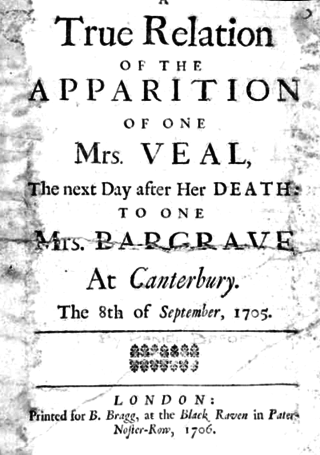
Daniel Defoe was an English novelist, journalist, merchant, pamphleteer and spy. He is most famous for his novel Robinson Crusoe, published in 1719, which is claimed to be second only to the Bible in its number of translations. He has been seen as one of the earliest proponents of the English novel, and helped to popularise the form in Britain with others such as Aphra Behn and Samuel Richardson. Defoe wrote many political tracts, was often in trouble with the authorities, and spent a period in prison. Intellectuals and political leaders paid attention to his fresh ideas and sometimes consulted him.

Robert Dodsley was an English bookseller, publisher, poet, playwright, and miscellaneous writer.
This article contains information about the literary events and publications of 1726.
Events from the year 1703 in literature.
This article contains information about the literary events and publications of 1704.
This article contains information about the literary events and publications of 1705.
Charles Gildon, was an English hack writer and translator. He produced biographies, essays, plays, poetry, fictional letters, fables, short stories, and criticism. He is remembered best as a target of Alexander Pope in Pope's Dunciad and his Epistle to Dr. Arbuthnot and as an enemy of Jonathan Swift. Due to Pope's caricature of Gildon as well as the volume and rapidity of his writings, Gildon has become the epitome of the hired pen and literary opportunist.

The Life, Adventures and Piracies of the Famous Captain Singleton is a novel by Daniel Defoe, originally published in 1720. It has been re-published multiple times since, some of which times were in 1840 1927, 1972 and 2008. Captain Singleton is believed to have been partly inspired by the exploits of the late 17th century English pirate Henry Every.

Augustan literature is a style of British literature produced during the reigns of Queen Anne, King George I, and George II in the first half of the 18th century and ending in the 1740s, with the deaths of Alexander Pope and Jonathan Swift, in 1744 and 1745, respectively. It was a literary epoch that featured the rapid development of the novel, an explosion in satire, the mutation of drama from political satire into melodrama and an evolution toward poetry of personal exploration. In philosophy, it was an age increasingly dominated by empiricism, while in the writings of political economy, it marked the evolution of mercantilism as a formal philosophy, the development of capitalism and the triumph of trade.

English nationalism is a nationalism that asserts that the English are a nation and promotes the cultural unity of English people. In a general sense, it comprises political and social movements and sentiment inspired by a love for English culture, language and history, and a sense of pride in England and the English people. English nationalists often see themselves as predominantly English rather than British.
Literature of the 18th century refers to world literature produced during the years 1700–1799.
John Tutchin was a radical Whig controversialist and gadfly English journalist, whose The Observator and earlier political activism earned him multiple trips before the bar. He was of a Puritan background and held strongly anti-Catholic views.
The "rights of Englishmen" are the traditional rights of English subjects and later English-speaking subjects of the British Crown.
Nationality words link to articles with information on the nation's poetry or literature.
Nationality words link to articles with information on the nation's poetry or literature.
Nationality words link to articles with information on the nation's poetry or literature.
Jeremy Hooker FRSL FLSW is an English poet, critic, teacher, and broadcaster. Central to his work are a concern with the relationship between personal identity and place.

James Drake (1667–1707) was an English physician and political writer, a Jacobite and Fellow of the Royal Society.

The Shortest Way with the Dissenters; Or, Proposals for the Establishment of the Church is a pamphlet written by Daniel Defoe, first published anonymously in 1702. Defoe was prompted to write the pamphlet by the increased hostility towards Dissenters in the wake of the accession of Queen Anne to the throne.

The Apparition of Mrs. Veal is a pamphlet that was published anonymously in 1706 and is usually attributed to Daniel Defoe. Titled in full A True Relation of the Apparition of one Mrs. Veal, the next Day after her Death: to one Mrs. Bargrave at Canterbury. The 8th of September, 1705, it has been described as "the first modern ghost story".







